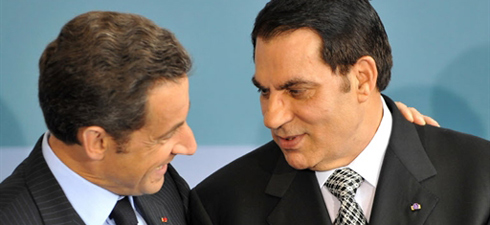“Shifting overnight from total support for a dictatorship to backing the democratic movement that follows is no easy feat. Hence the confusion and embarrassment of the French government’s statements in recent days on the “Jasmine Revolution" , writes Libération.
For Le Monde, French diplomacy, "forced to adapt to a chain of events that has overwhelmed it”, is left in a difficult position. It was thus not until 2 p.m. on January 15th, or 24 hours after the hurried exodus of Ben Ali, that the Elysee lined up for the first time on the side of those calling for a transition to democracy. And it was “one day behind the United States" that France called for free elections as soon as possible in its former protectorate. It must be said, the paper recalls, that "all of Sarkozy's predecessors had shown before him, if not complacency, then excessive caution at the very least towards this former French protectorate."
"To justify their waiting game during the days of bloody police repression in Tunisia," continues Le Monde, French officials have proclaimed, in a statement from the Elysee, "a vague concept" – that of "non- interference in the internal affairs of a sovereign state."
Alliot-Marie will find it even more difficult to backtrack
"The government is extremely embarrassed," notes Libération. Those principally accused by the press and the politicians: the Foreign Minister, Michèle Alliot Marie, who is being summoned to the National Assembly on January 18 to explain the inconsistency of French diplomacy not just in Tunisia but in Côte d'Ivoire as well. At the beginning of the revolt in Tunisia, Libération reports, the diplomats had proposed "the expertise of our security forces”, which would permit "the right to demonstrate without endangering security.”
"Michèle Alliot-Marie will find it even more difficult to backtrack, given that no-one in the government has been in hurry to support her", says Libération. While the opposition on the left is denouncing "a diplomacy of cynicism," the Minister of Defence, Alain Juppe admits that *"we have no doubt underestimated the degree of frustration of people living under a dictatorial police state.*”
“The French government is now focused on getting back on track,” observes La Croix. But the newspaper considers that "it is for Europe to take the lead, as did the chief diplomat of the EU, Catherine Ashton, in promising to support Tunisia in its efforts to build a ‘stable democracy’ and to prepare and organise elections – before conferring on the new Tunisia, on a day we hope will come soon, the ‘advanced status' that would strengthen the relations between the two shores of the Mediterranean, as equals.”
From the Commission
EU quiet on North Africa’s “stakeholders”
The EU may express “solidarity” with the Tunisian people, but it is quiet about the rest of North Africa, headlines the EUobserver. Refusing to be drawn in regarding the fate of other regimes in the region, foreign affairs spokeswoman Maja Kocijancic declared that "We cannot speculate on situations that are not ongoing." However, as the Brussels based website notes, as recently as this weekend “four suicide protests similar to the previous death of 26-year-old graduate Muhammad Bouazizi in Tunisia, took place in Algeria, while a pair also occurred in Mauritania and Egypt. Riots have swept Algeria in recent weeks over soaring food prices. In response, the government has lowered the price of cooking oil and sugar.” When pressed Ms Kocijancic declared "We are following the situation in Algeria closely. We have called for calm and restraint ... and called on the Algerian authorities to continue meaningful dialogue with all stakeholders.” Stakeholders?
Was this article useful? If so we are delighted!
It is freely available because we believe that the right to free and independent information is essential for democracy. But this right is not guaranteed forever, and independence comes at a cost. We need your support in order to continue publishing independent, multilingual news for all Europeans.
Discover our subscription offers and their exclusive benefits and become a member of our community now!












